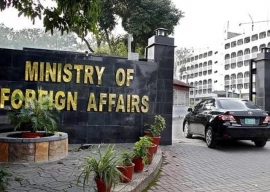
The concept of community oversight on the police department, though already in practice in many developed and developing countries, has largely remained ignored in Pakistan.
Consequently, in a heavily politicised department in Pakistan, the personnel are often accused of highhandedness and an absolute disregard for their professional obligations. Speakers at a seminar, organised by the Centre of Research and Security Studies on Tuesday, spoke about this subject and emphasised the importance of carrying out overarching reforms in the police force.

"The way Sindh and Balochistan stick to the archaic Police Act of 1861 reflect the feudalistic approach of the elected representatives in both the provinces," observed the former home secretary, Gul Muhammad Umrani. "The politicians desire a submissive police force and even bureaucracy as a whole. So, they either defend the colonial laws or delay legislation for reform."
He alleged that the politicians were concentrating power in their respective areas by getting people from their kith and kin appointed in the police and local bureaucracy. Each MPA and MNA wants at least one member of his family in the police and another in the district administration, he added.
Umrani also pointed out how the abolition of the district magistracy system removed oversight by a separate government department. He maintained that the old system consisted of checks and balances over the police officials which have now have withered away.
Hyderabad DIG Dr Sanaullah Abbasi stressed the importance of legislating and enforcing the conflict of interest law to restrict politicians and civil servants from involving in private enterprise. So far, Khyber Pakhtunkhwa is the only province to have introduced this law, he said.
The law states that conflict of interest occurs when a public office holder (PoH) uses official power, duty, function or non-public information in a manner that provides an opportunity to further his private interests or those of his relatives and friends
It also bars the PoHs from private employment, managing or operating a commercial activity directly or indirectly, serving in a corporation or business organisation, holding office in a union or professional association and paid consultancy. The violation of the law will elicit disciplinary or even penal action.
The DIG also lamented the lack of community oversight on the police stations which makes them less responsible to the residents. "A committee such as the Citizens-Police Liaison Committee should be formed in the jurisdiction of each police station. That local CPLC should not only supervise but also work as a bridge between the police and the residents," he suggested.
"We can hope for improvement if people begin to talk about the necessity of these things. The police and other government organisations need to be held accountable."
CPLC's Dr Qasim Fareed said that the shortfall in the strength of police force provides an excuse for many of the shortcomings in their performance. "Hyderabad's population has surged to about three million people but there are only around 900 policemen on active duty," he claimed.
According to details collected from the DIG office, the police to population ratio in Hyderabad stands at 778 people to one policeman. This is far lower than the 1861 Act which stipulated the ratio to be 450 people to one policeman.
MPA Rana Siddiqui stressed the need to appoint women in the police force, citing how the female gender suffered due to their shortage. The Human Rights Commission of Pakistan's regional director Dr Ashothama Lohano said the colonial police law aimed to persecute weaker segments in the society. He suggested that the police laws of the developed countries in West and Asia should be studied to bring exhaustive reforms.
Published in The Express Tribune, November 27th, 2014.


































COMMENTS
Comments are moderated and generally will be posted if they are on-topic and not abusive.
For more information, please see our Comments FAQ